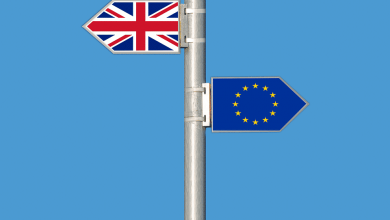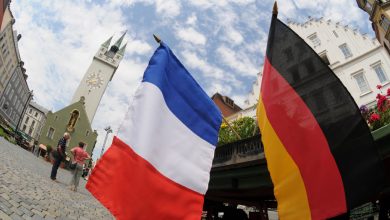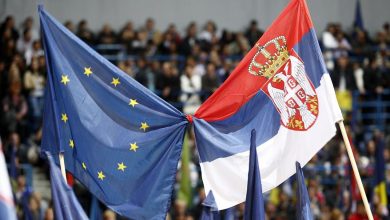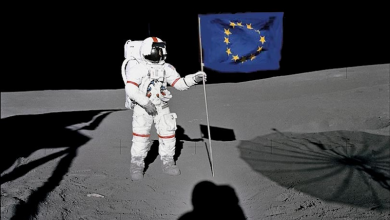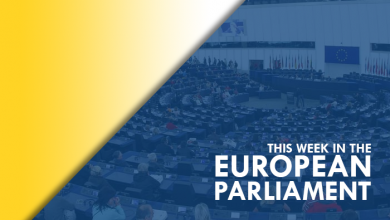The Far Right in France: Nationality vs. Citizenship

In Ancient Greece and Rome, populist movements sought to re-equilibre the distribution of wealth and power. Though less prominent during the feudal Middle Ages, occasional peasant revolts and urban resistance disturbed the social order. In France, in 1789, a populist-aristocratic, political schism violently redesigned the society. The concept of “citizen” re-emerged for the first time since Rome replacing or being used alongside that of nation. In post-revolutionary France, reordering this division became the major point of political contention over the next centuries. Having slumbered since the Pax Romana, these struggles are once again at the forefront of western and, indeed, world politics.
The Left – Right Divide
The most violent opposition to the French revolution internally came from the Vendee. These peasants and their lords were to the political right of the Girondins and even further right of the constitutional monarchists in the National Assembly. They were the main political opponents of the revolution. The Vendeen opposition was: monarchist, nationalist, Catholic, moralist, rural, and anti-democratic, which are many of the characteristics retained by factions of the modern French far right. The Jacobin left, leading the revolution, were: egalitarian, internationalist, anti-clerical, libertarian, urban, cosmopolitan, republican and democratic. These are characteristics embraced by the French left today. The conflict in the Vendee was so bloody, that some historians have called it genocidal.

The “Citizen”
The conception of “citizen”, introduced by the revolution, sought to replace the “French identity” clung to by the Vendeens. Derived from the Déclaration des droits de l’homme et du citoyen de 1789 – this set of principles was adopted as the basis for the Universal Declaration of the Rights of Man. This was followed by the UN Charter a century and a half later, and two years after by the European Convention. The concept of “citizen” was anchored in the “equality” of all men. Rights and duties of “citizens” were specifically addressed.
The citizen was “he or she who participated in the civic community, consequently spoke French, and respected French laws”. This concept broadly defined, while often breached in practice, did allow France to extend citizenship to its overseas possessions along with voting rights. With this, France differed fundamentally from the United Kingdom and other colonial powers. This was indeed a “revolution”, a simple Haiitian being the equal of a French king.
Nationality vs. Identity
The concept also differed fundamentally from that of “nationality” more common in other countries and closer to that of the Vendeens. French “nationality,” or what has now become “identity,” for the Vendeens was reserved for those with generational French roots, tied to the soil and the feudal web that defined their belonging to the nation. Whether their overlords were Normands, of several hundred year’s residence, or more recent Norman-Saxons claiming the crown, their French “identity” or “nationality” though ill-defined, was acquired with the feudal tie to the soil.
The revolution was victorious against the Vendee but was immediately challenged again by the armies of the united monarchies of Europe. These monarchies, not quite as ideologically rooted who were mostly concerned with power, still presented a challenge from the right which sought to retain the feudal order. Victorious but continuing to be under threat the following century was to see France swing to the right and then the left, as these competing visions struggled for power.
Through the Empire under Napoleon, the Restoration under Louis-Phillipe, Napoleon III and numerous Republics; the original schism was contested over and over. Still the vision of equality and universal citizenship at the heart of the revolution remained the dominant one through most of the period. In a nod to the progressive values of the revolution, Louis Philippe, the monarch of the restoration, was even called the ‘Citizen King of the French’, instead of the ‘King of France’.

Continuity Amidst Change: The Far Right in France
Today, many of the traditional political formations in France have transformed into unrecognisable hybrids. It is somewhat remarkable then that the dominant party of the far right retains an unbroken history as a party. That history dates back to its founding in 1972 as the National Front, which has now changed its name to the National Rally. Its ideology, with some differences, goes back to the revolt in the Vendee.
The very complex history of social-political movements of the far right in France could easily fill many hundreds of pages without even scratching the surface. This history is not lived with anything like encyclopedic knowledge by most French men and women but rather subconsciously, if at all. There are several places, where this political and social history intersects the daily lives of the French: 1) political and governing institutions; 2) media; 3) social organizations; and, 4) community. We will focus on some of the more salient points of intersection, highlighted – as well as some less accessible ones.
Political: The National Rally (RN), a Far Right Story
The Nationally Rally, originally the National Front, was founded in 1972 as a far right political movement by Jean Marie Le Pen, an ex-combatant in French Indo-China and Algeria. It was in this latter war that right wing elements of the army attempted a coup d’etat to prevent then president, General De Gaulle, from holding a referendum allowing for Algeria’s independence. The FN was the direct successor to another right wing movement Ordre Nouveau (ON) with its feet firmly in the fascist camp.
These movements had similar roots: persons, ideologies, organisation in the pre-war fascist extreme right. Some pre-war movements like Action Francaise ended by being banned and their leaders, Charles Maurras, imprisoned after the war, or the journalist and writer Robert Brasillach, executed for collaboration. These movements were rabidly anti-semitic, anti-immigrant, anti-freemason and anti-democratic. They called themselves fascist and used fascist symbols so we will not hesitate to use the term in their case. In some cases like Maurras they were anti-Nazi but pro-Vichy. In others , like Brassilach and the review “Je Suis Partout” collaborationist.

The FN and La Cité Catholique
At its founding the National Front clearly embraced these extreme positions. It is this history that, despite attempts to distance itself from its origins, causes many French people to remain skeptical and refuse to vote for the FN, regardless of any sympathy they might have for their now more moderate stance. Less extreme currents of the French right were also present in the FN and remain. However, they have become more marginal with time.
Catholic integrists, some monarchist and others republican, have since Vendee been a feature of the French right. While some Catholics embraced the extreme anti-semitism of Maurras and his followers, others did not. La Cité Catholique, an extreme Catholic movement, influenced many of the pro-putsch generals who wanted Algeria to remain French. Many French Catholics and their institutions were, however, staunchly republican and democratic. However, they tended to have a nationalist and identitary approach to politics. This Catholic right is not uniformly liberal or free-market, but often in a Gaullist or Christian Democratic vein, supportive of broad based social programs.
Family Matters: Marine and Marion Marechal Le Pen
When Jean Marie Le Pen’s daughter, Marine Le Pen, took control of the party, she began its re-orientation away from the anti-semitism of her father. She also refused an attempt by neoliberal elements within the party to move it to the right on social issues and insisted on its outreach to working French. While this has certainly helped increase the party’s popular base, the party’s failure wherever it has been elected to effectively manage municipal or departmental governments, has hurt its reputation in the economic sphere.
While the more moderate social stance of Le Pen’s daughter might have made the party more popular with moderate Catholic integrists, the conservative Catholic movement was severely weakened when it principal leader, Monsignor Lefebvre, was excommunicated in 1988 by Pope John Paul II. The ensuing Church schism shocked the conservative French Catholic world, leaving it leaderless.
While Marine Le Pen remains the RN’s leader and in control of its political platform and responsible for its name change, her niece Marion Marechal Le Pen has shown political ambitions of her own. With roots among Catholic integrists, she has developed ties with international populist movements and the alt-right. A champion of “identitaire” politics she has relations with international populist figures like the American, Steve Bannon or Italy’s Matteo Salvini. She is a potential political force, though for the time being has managed to remain under her aunt’s wary chaperon.

Lacking Orientation
The RN reached a one-time ceiling of about one-third of voters in French Presidential elections, doing less well in local and European contests. The party does not seem to have built the stable of qualified personnel capable to compete and govern beyond its leadership.
Applying Umberto Eco’s definition of fascism, the party in its current political orientation lacks some of the principal features of fascist movements. While the cult of an all powerful leader is in partial evidence, other traits like anti-intellectualism, anti-scientific bias, machismo and misogyny, belief in war as a permanent state and propaganda replacing political discourse, seem much less apparent.
Political: The Alt-Right and the “Identity Generation”
The alt-right is defined by elements of right wing politics that reject fascism and Nazi affiliation and prescribe a peaceful path to their eventual rise to power. While the RN has deep roots in the traditional parties of the right, Marion Marechal and, younger elements of the party, have associated themselves with, courted and sought to lead the alt-right both in France and Europe.
Identitaire politics and replacement theory affirm that European identity should be the primary European political focus and that, in opposition to a European renaissance, low birth rates and immigration represent a deliberate attempt by the elite to replace European populations with those of the third world. The group Generation Identité, with affiliates throughout Europe, has been a prime mover in furthering this philosophy.
“Identitaire” Politics
How the elites manage to influence millions of private natality decisions by women and their partners is not clearly addressed by the theory. They point to LGBTQ rights, acceptance of an alternative lifestyle and de-emphasis of family values by the left as root causes. These theories have been developed in France with its usual flair for abstract thought and spread throughout Europe with local variants. On the European level, ties between groups are tenuous though being constantly rewoven to fit changing circumstances.
Though alt-right and identitaire groups distance themselves from fascism and Nazism, they manifest considerably more fascist markers than the RN, the main right-wing movement in France. The fundamental desires of their members may be somewhat obscured by their official stances. An example of a latent tendency to violence might be seen in the attempted assassination of French President Chirac by an individual associated with far right groups who were subsequently banned. Though strictly more associated with the far right, the attempted assassin frequented the identitaire rock music scene. These groups, though organisationally separate, have a great deal of affinity and some ties.
Community: The Banlieu
The Parisian banlieu has, in recent times, been one of the principal locations of encounters between those seeking to become French and the hostility of those rejecting them. They have been called “no go” zones by the right, indicating the right’s actual or projected fear of these immigrants. Accusations regarding: high crime rates, the absence of police, supposed anti-LGBT biases, or mysoginist attitudes have been broadcast widely and are now staples of the unofficial debate on immigration. This is unfortunate, as objectively many of these assertions are based on false information. Experience of these communities may draw a picture consistent with most of the data.
My family spent several weeks – summers from about 2005 to 2012 – in the Parisian suburbs, the Yvelines, living in Elancourt and visiting Trappes daily and La Courneuve (Seine-Saint Denis) to the north on a somewhat less frequent basis. Trappes and Courneuve, are considered “no-go” zones by the right and the socio-economic profile of Elancourt is not much different from either. We were guests of immigrant friends.

Contrary to all the views, we never had the least problem of physical security. We were welcomed into the very diverse communities who live side by side. These include: the majority French, Muslim, African and Vietnamese among many smaller ones. The twice weekly markets were special: the great variety of foods, clothing, wares and general pleasant ambiance made them truly wonderful experiences. Community monitors policed the market on a voluntary basis. There was never even a hint of a pick-pocket let alone more serious crime. At the time, as it has been historically, the Mayor of Trappe was a French communist.
A Sense of Togetherness
The communities there all get along well and frequent each other socially on a regular basis. The immigrant communities have lived the gradual change in the political climate over the years without excessive fear but with increasing awareness that some people no longer welcome them. Whereas, they still rally to the concept of French citizenship, invoked in the Universal Rights of Man, they increasingly see that many believe it is not meant for them. Still those French natives around them do their best to reassure them through their daily interactions. It is not these neighbors who share their travails and joys who consider them foreign. They celebrated along with everyone else in France when the French national team won the World Cup in 1998 and in 2018, with the highest percent of foreign born players of any European team. These are considered by everyone French triumphs.
A Target Nation?
At about 8.8%, France has the largest Muslim population in Western Europe. French soldiers are actively fighting terrorists in their former colonies, which in turn, has made France a target. French Muslims and their leaders have repeatedly denounced terrorism by Islamic radicals and come to the aid of Jewish synagogues whenever ostensibly far right groups have attacked them. There have been few attacks by Muslims against Jews.
The period of the 1970’s saw as much Muslim terrorism as today, though from national liberation movements not religious fundamentalists. These tragic occurrences did not change the universalist, citizen based, discourse of France. This is no longer strictly the case. The situation has gone from one where it was taboo in the late 1990’s to express racial animus publicly, to one where several French presidents, have made anti-immigrant remarks.
Community: Rural France
Space and familiarity limit our discussion to to the rural southwest, the region between Bordeaux and Toulouse. The region generally votes “red” or Socialist though hardly reliably so. The reasons for this are singular tragedies in the long history of such events in Europe. Adult children of emigrants from Mussolini’s Italy, such as northern workers, persecuted unionists or simply the unemployed and republican exiles fleeing Spain, represent a very large percentage of the population. Practically all are thoroughly French, speak no Italian or Spanish, and have very rudimentary knowledge of their family history. There must be some latent memory though as most still vote red.
Recent immigrants to the rural southwest though, except for the numerous English with a second home, are rare, comprising less than five percent of the population in the towns and often only one or two elsewhere. They are plurality Muslim with other diverse representatives from: Mauritius, Reunion, Vietnam, etc. Being so few one would think that friction would be limited and people would have few occasions to form opinions but this was not the case. French acquaintances who deplored the not infrequent prejudices told me that they used to be rare, or at least hidden, but were becoming more and more prominent.

Far Right Voting Habits in the Southwest
Where there were second generation third world immigrants, and there were not many as most left for bigger cities, they were thoroughly French to the point where one could not tell them apart. One, Alain, was a descendant of “Harkis”, part of the Algerian Arab community who remained loyal to France in the Algerian civil war. The Harki were persecuted in Algeria but to the dismay of many, De Gaulle refused to help them escape after the war. Alain was so popular for his community work that he was considering running for mayor of his mid-sized town. Many wouldn’t realize he was of Arab origin.
The RN gets few votes in the area, unlike in other rural regions. However, there were a few French who voted RN and some in spite of having immigrant families. This was largely for economic reasons, as they did not believe the other parties were addressing their problems and hoped the RN would do so.
There is little real extremism of the left or right outside the big cities in the rural southwest of France. Even, or especially, the skin heads are generous and open-minded. Those of the region listen to Piaf, Ferre or Brel, as much as hard rock, and appear completely inoculated from the right wing politics of London, Paris or Eastern Europe. A picture of a region emerges which should be a paragon of harmony and idyllic rural life but for some reason the times have managed to instill fear and a degree of hate.

